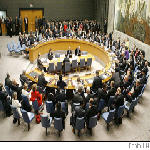 17 November 2006 ? The Security Council today added its voice to the chorus of United Nations calls for the two candidates and their supporters in the run-off presidential election in the Democratic Republic of the Congo (DRC) to avoid acts of violence after the release of provisional results and to use the law only to settle any challenges.
17 November 2006 ? The Security Council today added its voice to the chorus of United Nations calls for the two candidates and their supporters in the run-off presidential election in the Democratic Republic of the Congo (DRC) to avoid acts of violence after the release of provisional results and to use the law only to settle any challenges.
In a statement read out to the press by Ambassador Jorge Voto-Bernales of Peru, which holds the rotating Council presidency, the 15-member body ?appealed to the sense of civic responsibility of the Congolese people so that the electoral process could continue in a calm and peaceful climate.?
Provisional results released on Wednesday showed President Joseph Kabila leading Vice-President Jean-Pierre Bemba after the run-off round on 29 October, the last phase of the first free and fair elections in the DRC in 45 years. Final results are expected to be released on Sunday.
Council members ?called on all political actors to refrain from any provocation, incitement to hatred or recourse to violence,? condemning the violent incidents in the capital, Kinshasa, last Saturday that led to the deaths of four people.
They urged Mr. Kabila and Mr. Bemba to comply with the commitments they made in an agreement in August, and reiterated earlier this month, to remain calm, avoid violence and pursue electoral disputes through legal procedures only.
The Council statement follows a similar call earlier this week from Secretary-General Kofi Annan and from a meeting in Brussels involving Under-Secretary-General for Peacekeeping Operations Jean-Marie Guéhenno and officials from the European Union and the World Bank.
Today?s statement also ?commended the considerable efforts undertaken by the Congolese people and institutions, with the support of the international community, with a view to the holding of free, fair and transparent elections.?
The DRC elections, the largest and most complex polls which the UN has ever helped to organize, are aimed at cementing the vast and impoverished country?s transition to stability after a brutal six-year civil war that cost 4 million lives through fighting and attendant hunger and disease. Factional fighting remains a problem since the end of the war, especially in the east.
Related articles
- • European Union Sanctions Rwanda and M23 Officials over Congo Conflict (March 17, 2025)
- • Canada and Germany Impose Sanctions on Rwanda for Supporting M23 Rebels (March 4, 2025)
- • European Union Suspends Defence Consultations with Rwanda (February 24, 2025)
- • Felix Tshisekedi Sworn In as DR Congo President (January 24, 2019)
- • Constitutional Court Declares Tshisekedi Winner of Presidential Election (January 19, 2019)
- • Felix Tshisekedi Vows to Be the President of All Congolese (January 10, 2019)
- • Felix Tshisekedi Elected DR Congo President (January 10, 2019)
- • DR Congo Delays Results of December Election (January 6, 2019)
- • Botswana Urges Joseph Kabila to Step Down (February 26, 2018)
- • No elections in DR Congo in December without electronic voting machines: INEC (February 13, 2018)
- • US Warns DR Congo Against Electronic Voting for Delayed Election (February 12, 2018)
- • Felix Tshisekedi accuses INEC of illegally prolonging Kabila's mandate (October 24, 2017)
- • DRC Seeks Arrest of Presidential Candidate Moise Katumbi (May 19, 2016)
- • Papa Wemba Is Buried in Kinshasa (May 4, 2016)
- • Papa Wemba Awarded Highest National Honor as Thousands Pay Tribute (May 2, 2016)
- • Rights Groups: DR Congo Must Free Pro-democracy Activists (April 13, 2015)
- • Police Open Fire on Crowd Protesting Election Law Change (January 19, 2015)
- • Denis Mukwege Wins Sakharov Prize 2014 (October 21, 2014)
- • Etienne Tshisekedi Evacuated to Belgium for Medical Treatment (August 16, 2014)
- • Kerry Calls on Kabila to Honor Constitution (May 4, 2014)
- • Kerry in DR Congo for Security Talks (May 3, 2014)
- • DR Congo Takes Chairmanship of COMESA at Summit in Kinshasa (February 26, 2014)
- • New DR Congo amnesty law welcomed by UN envoys (February 5, 2014)
- • DR Congo Honors Nelson Mandela, Hero and Model for Humanity (December 6, 2013)
- • Congo Army Takes Control of Mbuzi Hill From M23 Rebels (November 4, 2013)
- • Kabila Congratulates Congo Army for Defeating M23 Rebels (October 30, 2013)
- • UN Security Council debate focuses on peace efforts for Africa's Great Lakes region (July 25, 2013)
- • DR Congo Eases Process for Starting a New Business (June 3, 2013)
- • Regional Leaders Sign DR Congo Peace Deal (February 24, 2013)
- • The M23 Rebels Want to Overthrow Kabila? Nonsense (November 28, 2012)







